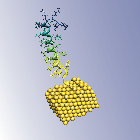Biomolecular Electronics Group
Dr Steven Johnson
Biomolecular Electronics Group
Dr Steven Johnson

The sequencing of the human genome has provided a wealth of valuable information regarding the genetic basis of disease. However, the existence of a mere 30.000 human genes that encode an equal number of proteins cannot explain the complexity of human life and disease. Protein function is tightly regulated by a vast number of modifications and by interactions with other molecules. A comprehensive understanding of cellular function, in both healthy and diseased cells, requires knowledge of the functional state of proteins. Because enzymes are proteins with a crucial role in many physiological processes and diseases, the measurement of multiple enzymatic activities in biological samples and their correlation with cellular function can improve the understanding of disease. Therefore, methods for the straightforward measurement of enzyme activity profiles are in high demand.
In collaboration with Dr Robin Bon, (School of Chemistry, University of Leeds) and with support from the EPSRC, we are developing a new label-free electrochemical spectroscopy method for the measurement of enzymatic activities using chemically functionalised microelectrodes. When used in a microarray format to measure the activities of multiple enzymes simultaneously, this simple and cheap detection method may enable the development of new point-of-care diagnostics.
The focus of this project will be on proteases, enzymes that cleave the amide bonds of proteins (and shorter peptides). This process often leads to the activation or inactivation of the substrate proteins. Misregulation of protease activity is linked to many diseases such as cancer and cardiovascular disease. Furthermore, viruses such as HIV and Hepatitis C encode proteases that they use to successfully infect their hosts. Therefore, the measurement of specific protease activity profiles in biological samples such as blood may assist the early diagnosis of such diseases, and help monitor progress during treatment.



